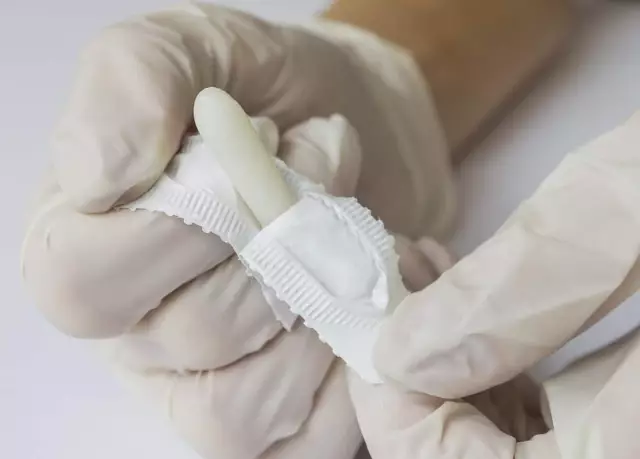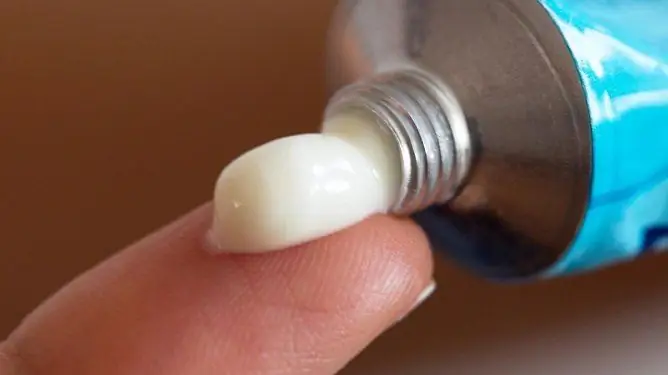- Author Rachel Wainwright wainwright@abchealthonline.com.
- Public 2023-12-15 07:39.
- Last modified 2025-11-02 20:14.
Effective and inexpensive suppositories and other medicines for the treatment of prostatitis
The content of the article:
- What is prostatitis?
- Classification
- Prostatitis as Pelvic Pain Syndrome
- The reasons
- Symptoms
-
Treatment of prostatitis
- Antibacterial agents
- Alpha blockers
- Psychotropic
- Anti-inflammatory
- Suppositories against prostatitis
- Diclofenac
- Bovgialuronidase azoxymer
- Bovine prostate extract
- Active complex Adenosin
- Reviews of doctors about suppositories against prostatitis
The prostate gland, or prostate, is the gland of external secretion of the complex of male genital organs of mammals, including humans, through which the urethra passes, due to which it blocks it during erection; her secret is thrown out during ejaculation and becomes part of the semen. Sometimes it becomes inflamed, in connection with which prostatitis develops.

What is prostatitis?
Prostatitis is an inflammatory lesion of the prostate gland (from the Latin prostata - prostate gland, and -itis - a medical suffix for inflammation). The causes of inflammation can be both infectious and non-infectious in nature: a sedentary lifestyle, prolonged sexual abstinence or excessive sexual activity, alcoholism, hypothermia, genital infections and foci of chronic infections. This is the reason for every hundredth visit to the emergency and emergency care and the diagnosis of every thirteenth patient of a urologist in developed countries. This frequency characterizes this disease as a folk. Of all the drugs used for CP, one of the leading places is taken by suppositories, in other words, suppositories.
Classification
Prostatitis can be acute and chronic, which in turn can occur in asymptomatic form and in the form of pelvic pain - here is a general list:
- Chronic pelvic pain syndrome, also known as non-infectious prostatitis, is the most common form, accounting for 90 to 95% of cases. In turn, this form can be inflammatory or non-inflammatory. This syndrome occurs in one in fifty men according to the most optimistic estimates;
- Chronic infectious prostatitis, on the other hand, is the least common, while within this form, most cases are caused by E. coli infection;
- Acute prostatitis - the most severe, requires emergency or urgent care;
- Asymptomatic prostatitis does not manifest itself in any way, except for an increase in the number of leukocytes in the blood (a sign of any inflammation): from 6 to 19 %% of patients have leukocytes in the semen, while not having any other symptoms.
Prostatitis as Pelvic Pain Syndrome
This disease occurs in all age groups in men, with the peak occurring at 35-45 years. In general, it manifests itself as soreness in the pelvis and during urination, while it does not carry signs of infection. In general, the cause of this form is unknown and its diagnosis is reduced to differentiation with other similar diseases: infectious prostatitis, benign prostatic hyperplasia, overactive bladder and bladder cancer - if these diseases are not the cause of pain, this diagnosis is made. This complicates not only diagnosis, but also treatment, since the exact target is not clear, therefore, preference is given to drugs with a wide range of effects. One way or another, the target is localized or associated with the prostate gland, so the most accurate treatment is possible when using suppositories.
The reasons
Despite the fact that the exact cause is unknown, a group of reasons is identified that may be associated with its development:
- Constant anxiety and stress lead to a constant contraction of the muscles of the pelvic floor, as a result of which pain points are formed, and they, in turn, intensify anxiety and stress, closing the vicious circle of pathogenesis;
- Disruption of the "hypothalamus - pituitary - adrenal glands" system, which is responsible for regulating the work of all glands, including the prostate, leads to so-called neurogenic inflammation. This can also be caused by stress;
- In some cases, it can be associated with cystitis, an inflammation of the bladder that causes pain when filled.
Symptoms
The main symptom is persistent pain in the pelvic region for three months or more. The pain can periodically subside and increase, be both debilitating and mild, and also spread to the back, rectum, perineum, testicles, pubis, penis and bladder area; nearby joints and muscles may hurt. Frequent urination and weakening of its control, on the contrary, are symptoms of cystitis, but not prostatitis. Pain after ejaculation is another common symptom. Sex drive and erection may also be reduced.
Treatment of prostatitis
Prolonged prostatitis is difficult to treat. The situation is aggravated by doctors' lack of understanding of the exact causes of the disease, since the impossibility of influencing the root cause also means the impossibility of reliably effective therapy. Treatment begins with psychotherapy, stress self-management, changing living conditions, and in particular giving up bad habits. Since the surgical methods of treating this form of prostatitis have not shown their effectiveness, after psychotherapy and self-administration, medications should be resorted to. CP treatment in most cases is complex, i.e. several drugs with different mechanisms of action are used simultaneously.
Antibacterial agents
On the one hand, the use of antibiotics for a reliably non-infectious disease is controversial, it is well known. On the other hand, some antibacterial agents work even in the absence of infection, as they have independent anti-inflammatory properties. Thus, fluoroquinolones, tetracyclines and macrolides block the action of proinflammatory cytokines, which justifies their treatment.
Alpha blockers
Tamsulosin and alfuzosin, which are commonly used for benign prostatic hyperplasia (adenoma), also show their effectiveness in treatment, but when taken continuously for at least three consecutive months.
Psychotropic
The antidepressant amitriptyline, hypnotics benzodiazepines, anticonvulsant gabapentin - all of them affect the central and peripheral nervous systems, thus removing the pathological dominant and weakening the constantly tense muscles of the pelvic region, which determines their role in treatment.
Anti-inflammatory
NSAIDs are proven to help with prostatitis, but they have a lot of unwanted side effects and show less efficiency compared to the above groups of medicines. In addition, there are other substances with anti-inflammatory activity, for example, bovine prostate extract and the biomass of gypsy moth larvae, the mechanisms of action of which differ from that of NSAIDs, and therefore their role in treatment increases.
Suppositories against prostatitis
Since the prostate gland borders on the rectal ampulla, its most targeted treatment is possible just rectally, with the help of suppositories. In addition, this dosage form has the highest bioavailability, which is close to injectable drugs and is significantly ahead of any drugs in tablets and capsules. Here is a list of drugs that may be in the home medicine cabinet of a patient with prostatitis:
Diclofenac
As an NSAID, this drug blocks the action of pro-inflammatory cytokines, thereby directly weakening the main link in pathogenesis - inflammation. However, the drug has side effects and is given in short courses to quickly relieve pain - without the addition of other drugs, symptoms return quickly
Bovgialuronidase azoxymer
This is a drug with the activity of hyaluronidase, that is, an enzyme that breaks down hyaluronic acid and chondroitin sulfate, of which connective tissue, in particular fibrous tissue, consists. Their cleavage facilitates tissue trophism, thereby reducing the degree of manifestations of inflammation, which is fundamentally important in treatment. Candles - "Longidaza". It should be noted that the drugs of this group act to a greater extent on the outcome of inflammation - fibrosis - rather than on its cause.
Bovine prostate extract
This drug of animal origin is similar in composition to a normal prostate, due to which it is able to treat it. It relieves the symptoms of inflammation, reduces swelling, and increases the tone of the bladder. Candles - Vitaprost, Prostatilen.
Active complex Adenosin
The drug appeared in Russia in 2019, is produced in candles and is a complex of active substances obtained from the biomass of gypsy moth larvae. The mechanism of action of Adenosin is based on a pronounced anti-inflammatory effect with a blockade of pro-inflammatory cytokines. In addition, the drug has antioxidant and vasoprotective effects. The result of the action of Adenosin is a decrease in pain and inflammation, a decrease in symptoms of impaired urination, a decrease in gland swelling and an improvement in its trophism, as well as maintaining normal prostate function.
Reviews of doctors about suppositories against prostatitis
Here is how experts say about the effectiveness of the use of suppositories for the treatment of prostatitis:
Doctor-urologist, Moscow, IV Nikolaev:
“Drugs for the treatment of chronic prostatitis can really be in different dosage forms, but one should be recommended - suppositories, that is, suppositories. The fact is that in this form the drug is released and reaches its target most fully, targeting the prostate gland. This is true for any medicinal substances, if they are enclosed in the dosage form of a suppository."
Andrologist, Ufa, A. A. Evsyukov:
“Chronic prostatitis is difficult to treat due to the fact that the exact cause is not fully understood, but two things are known for certain. The first is that the disease is related to the prostate gland. The second is that from preparations in the form of suppositories, medicinal substances are best released and reach the target organ, in this case the prostate. Therefore, if you give a recommendation for the treatment of chronic prostatitis, it is like this: choose suppositories."
Physician-therapist, Vladivostok, GI Aleksandrov:
“Middle-aged men often face the problem of prostatitis, and the need to treat it with medications in the form of suppositories worries them - the route of administration itself is worried. In fact, there is nothing reprehensible, unpleasant or scary in this. On the contrary, the delivery of the medicine from the suppository to the prostate occurs as fully as possible, and such treatment is as effective as possible - and with such an unpleasant disease, achieving a result is much more important than the sensation of treatment."
Found a mistake in the text? Select it and press Ctrl + Enter.






